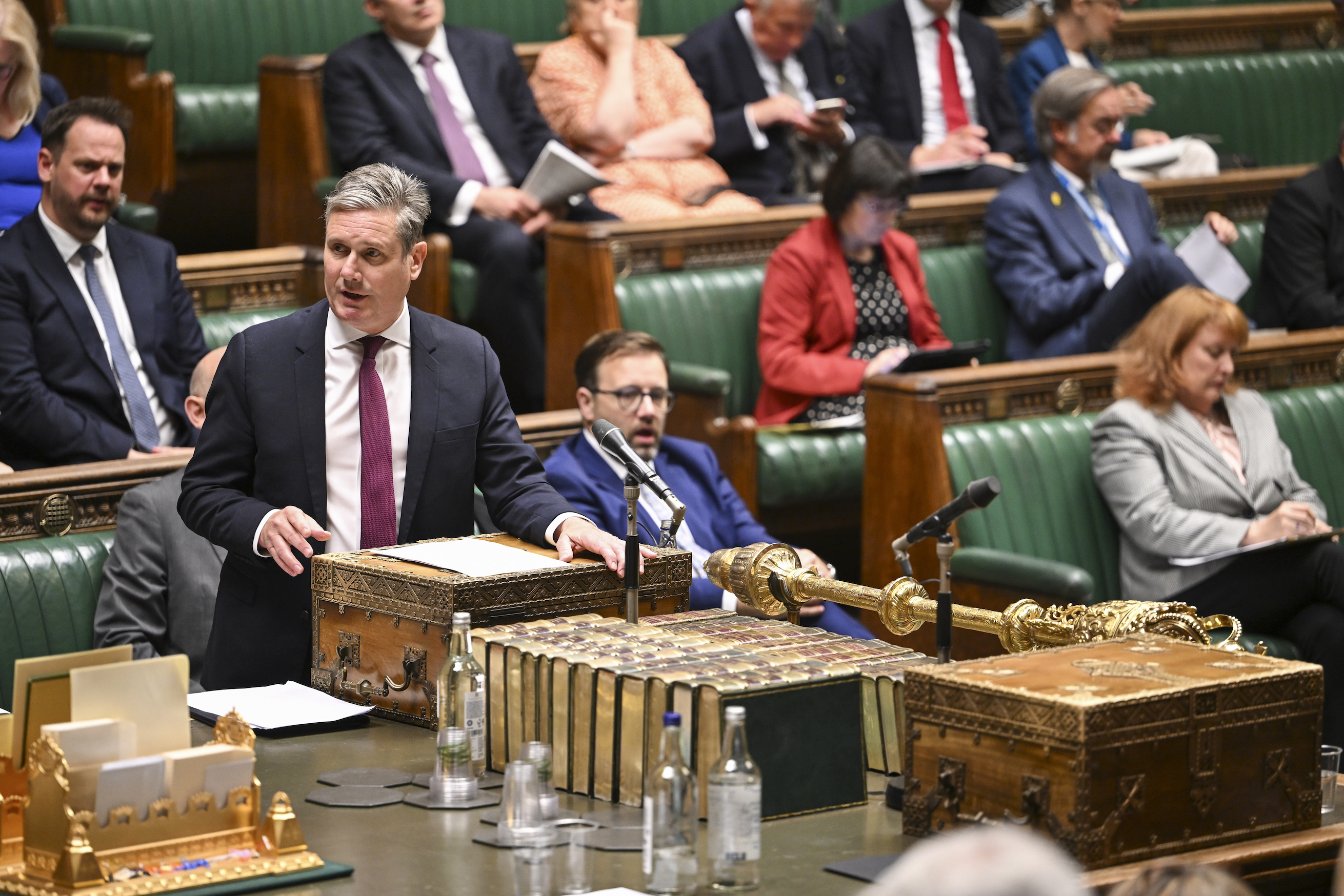Keir Starmer committed on Sunday to upholding the two-child benefit cap in a move that has triggered cross-factional consternation in Labour ranks.
The Labour leader said on Sunday that he was “not changing [the] policy”, which prevents parents from claiming child tax credit or universal credit for any third or subsequent child born after April 2017.
One wonders whether Starmer anticipated the backlash, as Labour MPs and senior party figures from across the UK take aim at the controversial approach.
The Scottish Labour leader Anas Sarwar, a figure who is an increasingly integral part of Starmer’s operation in the wake of the SNP’s problems north of the border, has openly distanced himself from the Labour’s Westminster leadership. He labelled the two-child benefits cap “heinous”, declaring he will lobby Sir Keir Starmer to scrap it.
Humanists UK celebrates ten year anniversary of Same-Sex Marriage Act

The Princess Royal visits BASC headquarters in Rossett
Other critics include senior MPs Meg Hillier and Stephen Timms, chairs of the public accounts committee and work and pensions committee respectively. “As time goes on, the case for the two-child limit will be increasingly hard to make”, Timms told the i newspaper.
These unlikely rebels join MPs Rosie Duffield, Lloyd Russell-Moyle, Stella Creasy and Clive Efford as well as four of Labour’s directly elected mayors — including Sadiq Khan — in speaking out against the move.
Then there is the reaction from the labour movement’s extra-parliamentary institutional elements. Labour party funder Unison, for example, called the two-child benefit cap “cruel”, and the Fabian Society, an affiliate typically sympathetic to Sir Keir, criticised it as “nasty dog-whistle” politics.
What is more, ahead of today’s showdown shadow cabinet meeting, the Times reported that at least one member of Sir Keir’s top team has threatened to quit the frontbench. A party official told the paper: “It’s a worry… The danger will not have passed until we are through a shadow cabinet meeting.”
Stepping back, and there are a number of reasons why the Labour leadership moved on Sunday to outline its commitment to the cap. First, and most obviously, the policy is thought to be broadly popular with voters. A YouGov poll from last week found 60 per cent of Britons want to keep the limit in place, as do a plurality of Labour voters by 47 per cent to 35 per cent.
But secondly, and more profoundly, the party wants to double down on its messaging on fiscal restraint, signalling once more that Labour is the party of sound finances. It marks a consistent strategy pursued under Starmer’s leadership in a bid to assume the mantle of economic credibility in the wake of Liz Truss’ “mini-budget” implosion last year. Accepting the framing that Truss-like fiscal loosening makes markets quiver, Starmer signals that Labour is ready and willing to steal the mantle of economic responsibility from the Conservatives.
In the wake of September’s Trussonomics-induced market tailspin, the party has become more consummate in emphasising its “fiscal rules” — the most overbearing of which commits the party to have debt falling as a share of national income within a first term in government. Sir Keir’s updated position on the two-child benefit cap might hence be considered a bid to show the party is taking its self-imposed fiscal shackles seriously, pre-empting Conservative attacks on profligacy.
Economic stability must come first, as Starmer wrote in an article for the Observer last week: “That will mean making tough choices, and having iron-clad fiscal rules”.
Matching Rishi Sunak’s rhetoric on “difficult decisions”, therefore, Starmer views book-balancing more and more as a political virtue. The two-child benefit cap position is merely another means by which Labour can signal its affinity to a ruthless fiscal regime.
Moreover, Starmer’s messaging on a rigid fiscal framework is so all-consuming that it takes only one slip-up, one nonconformist breach to undermine all the party’s work post-Truss. As one party insider told the Guardian in the wake of the two-child benefit cap row: “You can’t on one hand say that you want fiscal responsibility and on the other say there’s all these things you want to do but not how you’ll pay for them”.
Just as Labour committed clear rearguard action to water down the party’s £28 billion climate commitment, the leadership clearly thinks there are areas where Labour is still exposed to attack on accusations of profligacy. It has decided to act.
But there remain questions over whether the messaging over the two-child benefit cap has been right — or too forthright, more specifically. Indeed, when Sir Keir pledged on Sunday that he would “not change” the policy in government, there was clearly room for the Labour leader to be more equivocal.
He conspicuously did not suggest that the policy was “not a priority” or that “having assessed the state of Britain’s finances, Labour needs to readjust its proposals now and revisit the policy when public finances improve”. Instead, Starmer washed his hands of plans to abolish the cap with ruthless intent. The unequivocal nature of the U-turn surely explains some of the political furore that has flowed from it.
But Keir Starmer has honed his pitch as Labour leader by deliberately antagonising aspects of his parliamentary party. It is informed by the strategical assumption that, the more Labour’s left wing kicks and screams, the faster Labour’s prior flirtation with fiscal profligacy is exorcised from the electorate’s mind.
And, if the polls are anything to go by, then this has been a remarkably successful electoral gambit.
One wonders therefore, whether Starmer’s messaging is creeping deliberately rightward, targeting the party’s right-of-Corbyn “soft left” elements.
There is also a cumulative quality to Starmer’s strategy on fiscal restraint. The jettisoning of the commitment to abolish tuition fees, the watering down of the party’s £28 billion green energy stance and now the decision to maintain the two-child benefit cap — it all adds up. At each gap in the news cycle, Starmer picks a new policy to sacrifice on the altar of fiscal stolidity. This ruthless pursuit of fiscal prudence begins to build an image of what a Sir Keir-led government would look like. Ultimately, the Labour leadership hopes it is one swing voters can fall behind.
So in neutralising Conservative attacks on “tax and spend”, the Labour leadership performs its fiscal virtues with escalating severity. Starmer’s policy trajectory suggests there will be more economic contortions to come, with the Labour leadership cleaving as close to Conservative spending plans as possible.
Another point is that Westminster is currently abuzz with rumours of a forthcoming shadow cabinet reshuffle. With Starmer set to rejig his top team, therefore, the two-child benefit cap row could be used as a litmus test on an MP’s fidelity to the ruling regime. Ultimately, those concerned shadow cabinet ministers could be rewarded for their activism with a demotion as the Labour leadership rallies the right and singles out his “soft left”.
In the end, whether Starmer predicted the scale of the backlash over his commitment to the two-child benefit cap is not the question — because party insiders will now likely use the row as an opportunity to let Starmer’s top team form itself in his fiscally prudent image.
In time, we could potentially expect Labour’s rhetoric on the position to soften, with the party’s updated approach reconfigured on lines of policy “priorities” and the constraints applied by Conservative profligacy. (This was, after all, how Starmer and shadow chancellor Rachel Reeves successfully landed the party’s climbdown on its climate commitments).
But as the party reemphasises its progressive credentials and the structures containing its activist instincts — imposed by the Conservatives’ own emptying of Treasury coffers — the basic principle informing Starmer’s policy strategy has not altered. Labour’s platform, in Starmer’s view, must entirely conform to his vision of rigid, ruthless fiscal restraint.





















Discussion about this post